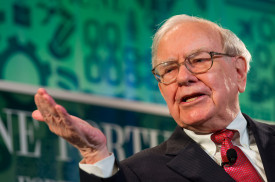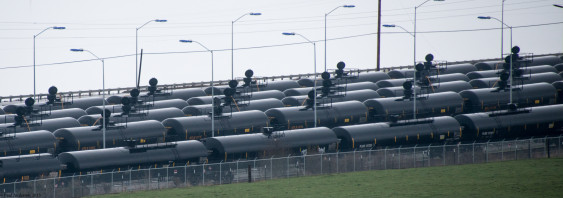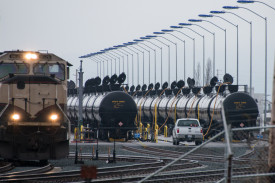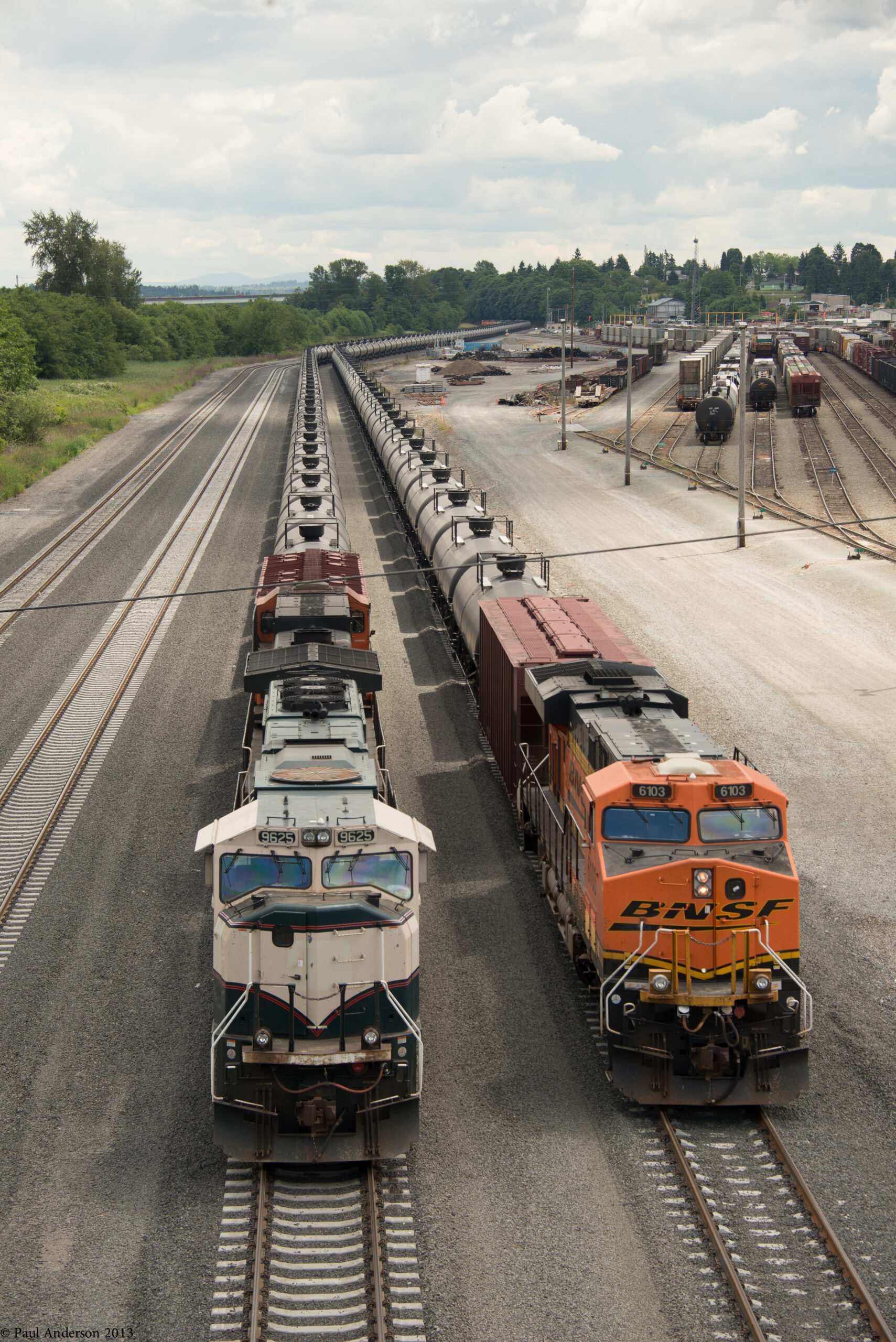[prettyquote]“Look for the UTLX logo on tank cars when you watch trains roll by. As a Berkshire shareholder, you own the cars with that insignia. When you spot a UTLX car, puff out your chest a bit…” – Berkshire Hathaway’s 2012 Annual Report[/prettyquote]
In our previous installment, we explored how unsafe DOT-111s, the Ford Pinto of rail cars, make up the vast majority of oil-filled tank cars now riding the rails in North America. With DOT-111s, there is no margin for error. A serious derailment will almost always lead to oil spills or explosions. But if they are so clearly dangerous, why are these tank cars still on the rails?
The reason, in short, is because the railroad and rail car industries have opposed new safety regulations. (The oil and ethanol industries have abetted their cause.) Citing supposedly onerous costs for retrofitting unsafe tank cars, as well as the related infrastructure to load and unload the products they carry, these companies have successfully argued against rules that would require them to make the upgrades that could prevent the explosions.
Behind many of the industry groups opposing hauling Bakken crude in only safe tank cars is a single figure: Warren Buffett.

Most people don’t realize it, but the tank cars that carry crude oil are not owned by the railroads that run them and are only rarely owned by the shippers who use them. In fact, roughly 80 percent of all the tank cars registered in North America are owned by companies that lease the tank cars to shippers. (Several of the major lessors also manufacture or repair tank cars.) These lessors—the actual owners of the tank cars—are the ones ultimately responsible for the fact that that the vast majority of oil trains today are largely composed of older models so riddled with obvious flaws that federal safety investigators have for years urged the entire fleet be retrofitted.
Yet despite a blizzard of news reports about oil train explosions, the owners of the tank cars involved are rarely, if ever, mentioned in the press. It’s a troubling omission, because these nearly invisible corporations are the ones who put the public at risk every day. Not only have they avoided pulling the hazardous DOT-111 tank cars out of service to retrofit them, but they have opposed and delayed meaningful federal regulation at every turn.
Buffett’s Berkshire Hathaway investment group is the biggest player in the tank car leasing business with around 40 percent of the market through its Marmon Group subsidiary, which owns both Union Tank Car Company (UTLX) and Procor Limted. At the end of 2012, Berkshire Hathaway owned 97,000 tank cars—a portion of which is dedicated to hauling ethanol and crude oil—with a net book value of $4 billion. The next biggest player, GATX Corp, is scarcely more than half the size. (Other major tank car owners include American Railcar Leasing; CIT Rail; General Electric Railcar Services Corporation; The Greenbrier Companies; and Trinity Rail Group, LLC.)
Buffett is also a major player in the railroad side of oil-by-rail. Berkshire Hathaway has full ownership of BNSF Railway Company, and BNSF is the biggest railroad player in the Bakken oil region, which currently supplies all the crude for Northwest oil-by-rail facilities. BNSF expects to have the capacity to ship as much as 1 million barrels of crude daily out of Montana and North Dakota. And BNSF isn’t some side line business for Berkshire Hathaway; it’s a major part of the firm, making up 13 percent of revenues in 2012.

Oil trains matter to Warren Buffett, and Warren Buffett matters to oil trains. Arguably, he is the single most important person in the world of oil-by-rail.
BNSF is no stranger to oil train explosions. In fact, an oil train blew up on a BNSF line a few miles outside Fargo, North Dakota, in December 2013. The Federal Railroad Administration subsequently revealed that since 2006 in the state of North Dakota alone BNSF had been cited by federal investigators for 13,141 defects where it was out of compliance with railroad safety standards, resulting in 721 official written safety violations.
Buffett and the rail industry are on record fighting against calls to recall and retrofit tank cars, though his role is sometimes cloaked by intermediaries. In the regulatory arena, Berkshire Hathaway interests are represented by active membership in an alphabet soup of trade associations and industry lobbying groups, including the American Association of Railroads (AAR), the Railway Supply Institute (RSI), and the North American Freight Car Association (NAFCA).
It doesn’t take much scrutiny to see that oil trains get special treatment. After all, if a jet plane has a battery fire problem, regulators immediately pull it from service and will ground the entire fleet until the manufacturer makes modifications to reduce the risk of fire. If an auto regularly bursts into flame upon impact, the feds issue a recall and mandate retrofits for all the cars with the defect. Yet despite explosion after deadly explosion—and safety report after federal safety report—government regulators, at the urging of the industry groups that represent Buffett’s holdings, have allowed unsafe DOT-111s tank cars to haul crude oil and ethanol.
After a deadly and high-profile ethanol train derailment in Cherry Valley, Illinois, the National Transportation Safety Board, the federal government’s independent transportation accident investigation agency, recommended retrofitting all existing tanks cars to safer standards. In response, the American Association of Railroads, in which BNSF is a prominent member, recommended that the government not require tank car retrofits. The AAR claimed that retrofits might cost $1 billion or more, as compared to just $63 million (plus 1 fatality and 11 injuries) for costs related to hazardous materials accidents during the period 2004 to 2008, the years preceding the Cherry Valley explosion.
Adding insult to injury after the Cherry Valley derailment, the industry groups in which Buffett entities are active members have also opposed removing the bottom outlet valves that protrude from the bottom of DOT-111 tank cars. These bottom outlet valves are something like an Achilles Heel for DOT-111 tank cars, compromising the safety of even newer models. Federal safety investigators have concluded that removing theses valves would yield a “significant improvement” to tank car safety and could be “easily accomplished.” But because removing the valves would also necessitate modifying oil loading and unloading infrastructure—infrastructure the oil industry is building at a breakneck pace—the oil-by-rail industry has opposed reform, on the grounds that these modifications, in the words of AAR, “would be impracticable.”
Even worse, Buffett’s BNSF opposes even the mildest expressions of concern over oil-by-rail shipments. Beleaguered by bad press about oil train explosions, the firm recently announced plans to purchase 5,000 new tank cars (though they declined to specify a timeline). Yet the firm’s political activities give lie to their PR spin. Just two days earlier, BNSF had lobbied the Washington legislature to oppose a bill asking for basic disclosure about oil trains. A few weeks before that, BNSF had lobbied the state legislature in opposition to union-supported safety legislation to require at least two-person crews on oil and other freight trains, despite the fact that a horrifying and deadly explosion in Lac-Megantic ,Quebec on July 2013 that killed 47 people and burned much of the city’s downtown to the ground had occurred on an oil train manned by only a single crew member.
After the Lac-Megantic oil train derailment, federal agencies opened up another round of “rule-making” concerning DOT-111 tank cars used for crude oil transport. After nearly twenty years of resisting the need to upgrade all tank cars carrying crude oil and ethanol, the North American Freight Car Association and the Railway Supply Institute, which represent Buffet’s Union Tank Car Company (UTLX) and other tank car lessors, now supported in their comments retrofitting existing tank cars—but only over a period of ten years or more. Industry provided pages of details on the capacities of tank car manufacturing shops, parts suppliers, and other related operations that make it clear that there is no way—despite their acknowledgement of flaws in older DOT-111s—that new tank cars can be built, or old tank cars modified, quickly enough to transport the flood of Bakken crude safely.

Over the last few years, crude oil from the Bakken formation has driven a tsunami of growth in the industry, with oil-by-rail volumes up 57 times above pre-2010 levels. If the industry had not spent years fighting against retrofitting existing tank cars—or had simply followed the NTSB’s recommendations from the 1990s—oil-bearing DOT-111s would now be much safer. But today the unfortunate reality is that the older unsafe tank cars will still be used to transport crude oil for the foreseeable future—at least as long as the industry is committed to moving as much crude as possible out of the Bakken region as fast as possible.
During a recent CNBC appearance, Buffett acknowledged that, “…we have found in the last year or so that it’s more dangerous to move certain types of crude, certainly, than was thought previously.” And while he said that changes should be made to tank cars, left unanswered was the question: why is Buffett transporting any Bakken in unsafe tank cars knowing now what a risk this creates? There is nothing stopping Buffett and the tank car industry from decommissioning the outdated rail cars, running only new or retrofitted tank cars, and eliminating bottom outlet valves. Nothing except that it would put a crimp in profits.
Warren Buffett is rightly regarded a legendary investor for having made big successful bets throughout his career, including during the depths of the Great Recession when he bought BNSF. But now he and the other tank car lessors are rolling the dice with their investors’ money and peoples’ lives with every oil train trip that employs unsafe tank cars. Each run has to be perfect, as a serious derailment of older DOT-111s will almost certainly lead to breaching, and very likely exploding, tank cars. The time is right for Buffett to hedge his oil industry bets: he should use only safe tank cars to transport Bakken crude oil.
Rich Feldman is a researcher and transportation energy consultant in Seattle.


Comments are closed.